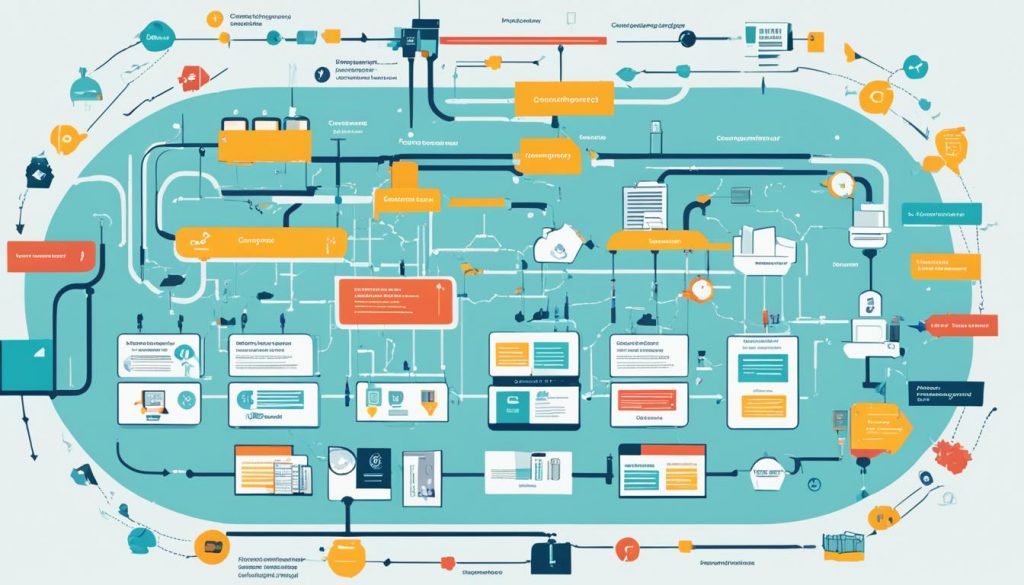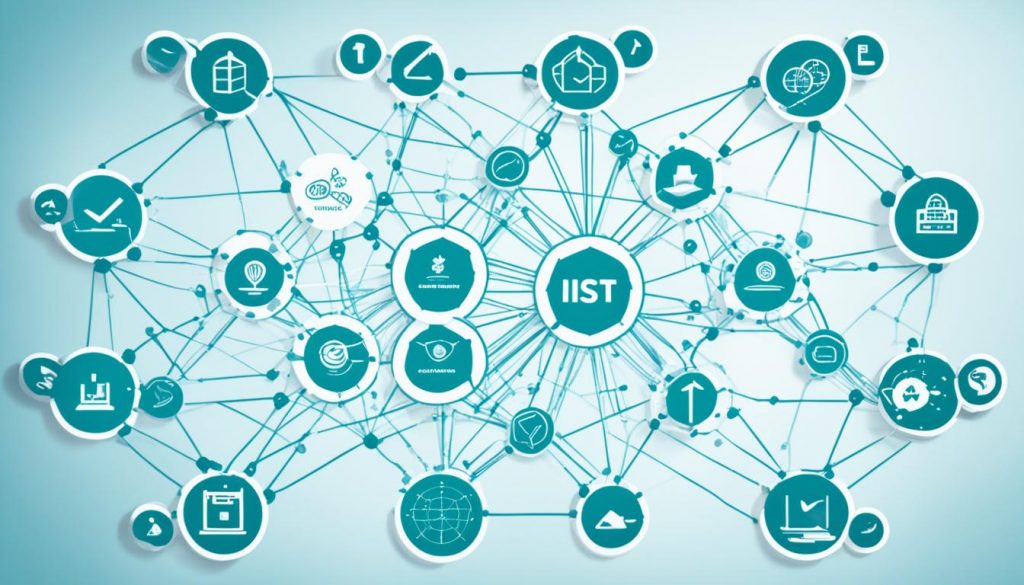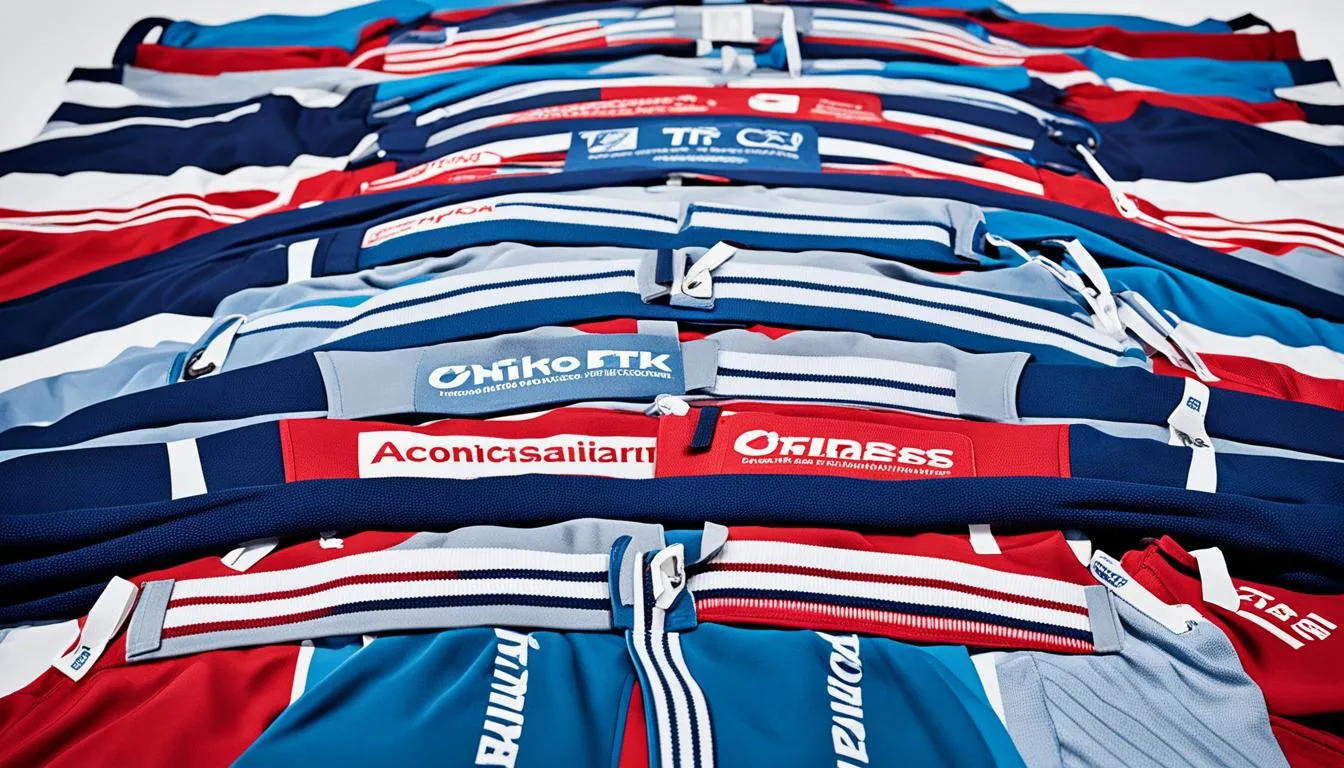The Role of Blockchain in Enhancing Supply Chain Visibility
Connect With Us Today
Consider us for your next production run. Why wait? Send us your questions here.
We are living in a time where integrating blockchain into supply chains brings major benefits. This technology is key for maintaining visibility in today’s global economy. By using blockchain, companies can gain efficiency, support sustainable sourcing, and save money.
Blockchain is making a big difference in how companies run their supply chains. For instance, FedEx, DeBeers, and Walmart use it to improve traceability and ensure ethical sourcing. This technology helps solve problems like miscommunication, waste, and fraud, leading to a brighter future of clear, cooperative supply chains that save money.
Key Takeaways
- Adoption of blockchain technology leads to enhanced supply chain visibility and operational transparency.
- Blockchain facilitates ethical sustainable sourcing, elevating organizational practices and consumer trust.
- Streamlining communication in supply chains via blockchain can significantly reduce waste and associated costs.
- Leading companies exemplify the successful application of blockchain in achieving greater traceability in supply chains.
- The expansive growth in research underscores blockchain’s suitability across diverse industry sectors for supply chain improvements.
- Strides by industry alliances such as BiTA advocate for unified blockchain standards that could reshape the logistics landscape.
Introduction to Blockchain and Its Illustrious Potential for Supply Chains
As pioneers, we have seen blockchain grow from a cryptocurrency base to a key in blockchain supply chain management. This system is known for financial clarity. It also offers major benefits to different industries. Blockchain brings digital accountability and better efficiency to complex supply chains.
The core of blockchain use cases in supply chain is tracking products from start to finish. This digital tracking ensures reliable delivery. It also proves each product’s realness, building trust with customers.
In our talks on blockchain supply chain management, Phantasma’s energy use is notable; it uses about 52,500 kWh yearly. This amount is like the energy five American homes use in one year. Phantasma showcases how digital changes can be eco-friendly.
Creating over 10,000 ecoNFTs on Phantasma uses less energy than making coffee for six and a half minutes. This move is towards a greener digital world.
Phantasma and Save Planet Earth planted over 100 million trees. They work on many projects to catch carbon. They also buy CCNFTs to cut down 4,378,506 metric tonnes of CO2 emissions yearly in Bangladesh. This is 400% more than what they emit.
Compared to old blockchain technologies, Phantasma shows a big leap. It shows that moving to eco-friendly options like Phantasma’s stake is better. It offers both ethical and functional improvements in various fields.
- Enhanced traceability across the supply chain
- Reduction in fraudulent activities and counterfeit products
- Improved partner coordination, enabling smoother market adaptations
- Intelligent investment strategies to reinforce supply chain resilience
During COVID-19, over 80% of global organizations faced big disruptions, especially in oil and gas. Blockchain’s adaptability became crucial. Companies had to deal with less staff, missing materials, and pauses in production.
| Aspect | Impact on Oil & Gas Industry | Blockchain’s Role |
|---|---|---|
| Collaboration Intensity | Highest among resilience drivers | Enables decentralized coordination |
| Agility in Supply Chain | Crucial for overcoming market volatility | Facilitates dynamic response to change |
| Resilience Strategies | Essential for business continuity | Supports diversification and reshoring |
| Intelligent Investments | Necessary for modernization | Drives smarter, autonomous supply operations |
Blockchain transforms supply chains in big ways. It’s vital for a robust, open, and green worldwide trade.
Demystifying How Blockchain Technology Operates
When talking about improving supply chain management, blockchain technology often comes up. A blockchain is basically a digital notebook. It’s a system that records, confirms, and keeps transactions secure without central control.
The Digital Ledger and Decentralized Nature of Blockchain
Blockchain has changed the game by distributing the digital ledger across many computers. This setup improves the trustworthiness and access to transaction data. It moves away from databases that have a single failure point. With blockchain, transactions become reliable and open, yet secure. This changes how supply chains manage transaction security.
Each block holds transactions that, once checked, are permanently recorded. Everyone can see the transactions, but no one can alter them.
Transaction Security: The Role of Public-Private Key Pairs
Blockchain uses special key pairs to keep transactions safe. These keys are vital for cryptographic security. They help verify the identities in a transaction while preventing unauthorized access. This helps greatly in today’s world, where cyber threats are everywhere.
These keys ensure the security of complex supply chains. Transactions are signed with a sender’s private key. They can only be checked with the sender’s public key. If data is messed with, the digital signature shows it, stopping fraud.
As we dive deeper into blockchain for supply chains, its benefits become clear. Protected transactions and secure data matter a lot. From making to delivering goods, blockchain helps at every stage. It makes supply chains more secure, efficient, and green. This is key for a better supply chain future.
Evaluating the Need for Blockchain in Current Supply Chain Dynamics
In today’s complex world of logistics, we see urgent needs that push supply chain innovation forward. The main problems include opacity and inefficiency, which expose the system to illegal activities. The movement of global supplies faces high risks, with fake products harming trade and trust.
Challenges Posed by Modern Supply Chains
A 2019 study highlights the issues with blockchain adoption in supply chains in India and the USA. Research from 2021 shows the struggles of adding blockchain for sustainable supply chains. The drive for transparency led to a 2021 conference discussing supply chain management advances.

Combatting Illegal Practices with Immutable Records
Blockchain’s unchangeable records might be the key to fixing these deep-rooted problems. An analysis of 178 articles in 2018 and other journals examines blockchain’s role in supply chains. A 2017 conference found that blockchain could make digital supply chains stronger—critical for food SMEs during COVID-19, according to a 2021 study.
Blockchain helps stop the flow of fake goods and parts. As shown in a 2020 study, it secures supply chains against illegal activities. It aligns with our goals to base supply chains on digital, tamper-proof standards.
Integrating Blockchain for Intelligent Supply Chain Operations
Blockchain technology is changing how supply chains work. It’s key for companies using AI and ML to improve their operations. By integrating technologies, supply chains become smarter and more efficient. This approach makes supply chains adapt better to changes and challenges.
Leveraging AI and ML in Conjunction with Blockchain
Using AI and ML with blockchain boosts predicting issues before they happen. Companies like IBM lead this effort with IBM Blockchain for better supply chain visibility. IBM Food Trust™, for example, connects everyone from farmers to retailers to ensure food safety.
Supply Chain Optimization through Enhanced Data Unification
Supply chain data is often scattered. Blockchain brings everything together on a single platform. This was especially helpful during the Covid-19 crisis for reliable data. Companies like FedEx, DeBeers, and Walmart improved their supply chains with blockchain for better tracking and inventory management.
The Home Depot and the Renault Group showed how blockchain streamlines vendor issues and document management. The Valencia Port Foundation’s work with IBM highlights blockchain’s wide industry use.
The Vertrax Blockchain and Trust Your Supplier demonstrate blockchain’s role in making supply chains transparent and efficient. They help with managing supplier relationships better.
| Blockchain Impact | Operational Advantages | Strategic Investments |
|---|---|---|
| Audit Trail Integrity | Significant cost savings and reduced stock loss | Focus on predicting supply chain risks |
| Enhanced Transparency | Improved efficiency and contract compliance | Enable ESG tracking to promote sustainability |
| Trusted Data Exchange | Reduced processing times and paper-based workflows | Enhance multi-stakeholder trust and visibility |
| Stakeholder Collaboration | Supply chain resilience during crises | Faster adaptation to market changes |
Looking forward, organizations must value data exchange, trust, and careful analysis of costs and benefits. These are vital for successful blockchain use in supply chains.
As blockchain grows in the market, it’s clear it’s vital for modern supply chains. It helps manage risks, improve visibility, and makes trusted operations the norm.
Exploring Diverse Blockchain Applications in Supply Chain Management
Blockchain technology is changing the supply chain industry significantly. It boosts transparency, efficiency, and reliability. Besides financial transactions, blockchain aids product traceability and smart contracts. This revolutionizes the business environment.
Tracing Products to Their Origin with Blockchain
Counterfeit products are a big problem in the supply chain. In some places, up to 70% of counterfeit drugs come from supply chain gaps. This is dangerous for public health and safety. Blockchain helps solve this by making product tracking better.
With blockchain, it’s quicker to trace prescription drugs from 16 weeks to just 2 seconds. This shows its powerful impact.
Big companies recognize blockchain’s value in tracking products. For instance, the Renault Group uses blockchain for managing supply chain documents. IBM and the Valencia Port Foundation also use blockchain to improve port logistics. They make global trade more secure and efficient.
Strengthening Contractual Engagement Using Smart Contracts
Blockchain also changes how contracts work in supply chains. Smart contracts are self-executing and unchangeable. They ensure that agreements are followed automatically and reliably. This improves relationships between suppliers.
For example, The Home Depot uses blockchain to better manage supplier relations and quickly solve disputes.
| Application | Example | Outcome |
|---|---|---|
| Documentation Management | Renault Group | Enhanced control over supply chain documentation |
| Product Tracing | Prescription Drugs | Traceability time reduced from 16 weeks to 2 seconds |
| Port Logistics | IBM and Valencia Port Foundation | Streamlined logistics and improved security |
| Supplier Relationships | The Home Depot | Improved trust and faster dispute resolution |
Researchers are also focusing on blockchain in supply chain management (SCM). They are studying its sustainable benefits in supply chains. Their research involves reviews of hundreds of papers. This includes analyzing facets like revenue management and SCM.
Experts are examining blockchain’s impact over the last decade. They are looking into its role in improving visibility, traceability, and digitalization in supply chains. Their reviews cover a wide range of sectors and approaches.
As leaders in utilizing blockchain, we’re entering a new phase in supply chain management. Blockchain promises better product tracking, secure contracts, and trust in transactions. It’s leading us to a more secure, transparent, and effective global trade system.
Unpacking the Multifaceted Benefits of Blockchain in the Supply Chain
Blockchain changes the game in supply chain management. It offers a level of transparency and reliability never seen before. This decentralized ledger is tamper-proof, slashing fraud and errors.
One major perk is better visibility of the supply chain. This lets businesses track goods and transactions very closely. With this advantage, companies can ensure their products are genuine and safe. This matters a lot today, as customers want to know more about what they buy. Plus, improving supply chain with blockchain helps to quickly find and fix inefficiencies.
Blockchain is not just a technology; it is a paradigm shift in how we conceive trust and transparency in business transactions.
Statistics show blockchain is revolutionizing international trade. It has proven effective in managing complex financial transactions, like letters of credit. But, mastering the tech and legal stuff is essential for its full benefits.
Blockchain can also boost compliance with the World Trade Organization’s rules. It makes customs and government processes smoother. Given the complicated nature of global trade, making blockchain systems work together is key.
- Digitalization of finance and customs for effective international trade
- Blockchain’s role in assuring the integrity of logistics and transportation channels
- Securing intellectual property across borders
In the end, blockchain’s impact on supply chains and trade requires a tech-savvy and holistic approach. It’s not just about trying new gadgets. It’s about revamping the global business playground.
The Role of Blockchain in Enhancing Supply Chain Visibility
Exploring supply chain transparency highlights blockchain’s importance. Shocking stats show up to 70% of pharmaceuticals in some countries are fake. This harms public health. Blockchain is changing this by making it easier to verify where drugs come from. A study involving KPMG, Merck, Walmart, and IBM reduced drug tracing time from 16 weeks to two seconds.

Establishing Transparent Supply Chains with Real-time Data
Blockchain provides unmatched real-time supply chain data. The IBM Blockchain Transparent Supply tool proves it’s fast and gives full visibility. During events like the Covid-19 pandemic, demand suddenly went up. Blockchain, like the Vertrax Blockchain, helped oil and gas supply chains keep up. This kept the supply chain resilient and transparent.
Enabling Security and Trust through Decentralization
Blockchain’s decentralized nature boosts security and trust. Companies like The Home Depot use it to improve supplier relationships and solve disputes faster. Blockchain builds trust by ensuring record accuracy. This protects against fraud which is common in supply chains today.
| Company | Blockchain Impact |
|---|---|
| IBM & Valencia Port Foundation | Revolutionized seaport logistics and data sharing |
| The Home Depot | Enhanced dispute resolution, tighter supplier ties |
| Trust Your Supplier | Streamlined supplier onboarding with digital ID verification |
| IBM Food Trust™ | Improved safety, freshness in food supply chains |
To sum up, successful blockchain use in supply chains needs teamwork, trust, and focusing on common gains. While 43% of Western companies haven’t used blockchain yet, others like FedEx and DeBeers lead by example. They promote ethical sourcing and set high standards for transparency. By 2025, global blockchain revenue is expected to reach $39 billion. This shows blockchain’s growing impact on supply chain management.
Addressing the Challenges in Blockchain Adoption for Supply Chains
Modern supply chains face many challenges when adopting blockchain. Challenges in blockchain adoption are critical for industry leaders. Issues like scalability and how well it handles many transactions stand out. Besides, making diverse blockchain systems work together needs standard rules.
The General Data Protection Regulation (GDPR) highlights the need for data protection. Blockchain must balance its openness with GDPR’s privacy requirements. Blockchain supply chain solutions should maintain privacy but still follow GDPR.
DAOs and DeFi show blockchain’s wide range of use. They bring new methods to manage and oversee supply chains. Yet, fitting these new ideas into established ways of working raises concerns.
“Blockchain is the bedrock upon which we can build a new era for supply chain management—one characterized by transparency, security, and immutable traceability.”
Adopting blockchain technology changes how organizations operate. It’s not just about new tech; it’s a shift in culture and workflow. This shift demands a big investment in money and effort to blend blockchain technology smoothly into operations.
Enhancing Supply Chain Capabilities with Blockchain and Complementary Technologies
Exploring the mix of technology and practicality reveals blockchain as a key player for innovation in supply chains. It brings about a new era of trust, transparency, and traceability. This marks a big change for how things are tracked and managed.
Blockchain’s impact grows even stronger when paired with the Internet of Things (IoT). Together, they track goods globally with unmatched transparency. This combination provides a clear view of products’ journey, enhancing the blockchain with IoT’s real-time updates.
Blockchain and IoT: A Symbiotic Relationship for Supply Chain Efficacy
Combining IoT with blockchain platforms creates a live, data-rich setting. This smart blockchain supply chain solution ensures data from IoT is securely recorded. It cuts down on mistakes and reduces unnecessary costs significantly.
Smart Contracts and Automated Compliance in Supply Chains
Smart contracts automatically enforce agreements using code. They make blockchain essential for meeting regulations smoothly, without extra bureaucracy.
Here are key statistics:
- Blockchain makes processes smoother and cheaper by cutting down on paperwork and errors.
- It boosts security with unchangeable records, stopping fraud and unauthorized access.
- It adds transparency by recording transactions in several places, allowing instant access for all in the network.
- It gives real-time tracking of assets, important for proving authenticity and meeting ethical standards.
| Industry | Blockchain Impact | Outcome |
|---|---|---|
| Food Industry | Reduced waste, faster problem-solving | Stronger supply chains |
| Finance | Removal of transaction friction | Increased operational efficiency |
| Healthcare | Enhanced security for patient data | Streamlined record-sharing |
| Pharmaceuticals | Counterfeit prevention, recall facilitation | Improved product tracking |
| Government | Secure inter-agency data sharing | Enhanced trust and compliance |
| Insurance | Smart contracts for process automation | Lower costs and fraud occurrences |
This new strategy moves supply chain management forward. It merges blockchain supply chain solutions with IoT into a powerful partnership. We are about to see big advancements in making supply chains smarter, more compliant, and stronger.
Conclusion
We’ve delved into how blockchain is changing supply chains. We looked at 178 research articles from fields like Computer Science, Business Management, and Social Sciences. These studies show blockchain’s rapid growth, especially since 2017. Today, we’re at the edge of a huge tech shift. Blockchain is making supply chains more transparent, secure, and efficient.
Blockchain improves traceability, reliability, and security in supply chains. It’s not just new tech; it’s a major shift. It offers real solutions that change industries. Take Wal-Mart’s partnership with IBM’s Food Trust as an example. It makes food products safer and tracking faster. Blockchain can change many areas, from banking to education, showing its wide use and potential.
Our study finds that over 9 percent of global industry leaders are using blockchain. This points to a big move towards sustainable business. Experts highlight the need for transparency. Leaders like Liu and Chin stress how blockchain improves communication and reduces mistakes. Blockchain is leading the way to a clearer, more ethical, and efficient future in supply chain management. We’re all for combining blockchain with IoT and AI. This trio can greatly improve global supply chains.
FAQ
What is blockchain technology and how is it relevant to supply chain management?
Can you explain the operational mechanics of blockchain technology?
What are the current challenges in modern supply chains that blockchain can address?
How does integrating blockchain lead to more intelligent supply chain operations?
What are the various applications of blockchain in supply chain management?
How does blockchain technology improve supply chain transparency?
What are the advantages of using blockchain compared to traditional supply chain management tools?
What challenges might organizations face when adopting blockchain in their supply chains?
How do blockchain and IoT work together to enhance supply chains?
What role do smart contracts play in supply chain management?
Source Links
- https://www.forbes.com/sites/forbestechcouncil/2021/11/08/blockchain-in-supply-chain/
- https://www.ncbi.nlm.nih.gov/pmc/articles/PMC7522652/
- https://www.newswire.com/news/phantasma-is-now-a-carbon-negative-blockchain-21585437
- https://www.ncbi.nlm.nih.gov/pmc/articles/PMC8958777/
- https://www.natlawreview.com/article/introduction-what-supply-chain-management
- https://www.igi-global.com/dictionary/drivers-of-sustainable-supply-chain-management-using-internet-of-things-based-blockchain-technology/57155
- https://www.ncbi.nlm.nih.gov/pmc/articles/PMC10358506/
- https://www.ibm.com/blockchain-supply-chain
- https://www2.deloitte.com/us/en/pages/operations/articles/blockchain-supply-chain-innovation.html
- https://www.mdpi.com/2078-2489/14/10/557
- https://www.ibm.com/downloads/cas/KJDPQKBE
- https://www.ncbi.nlm.nih.gov/pmc/articles/PMC9797894/
- https://www.igi-global.com/viewtitle.aspx?TitleId=337347&isxn=9798369304822
- https://www.ibm.com/topics/benefits-of-blockchain
- https://fintech.morgan.edu/wp-content/uploads/The-Effect-of-Blockchain-Technology-on-Supply-Chain-Sustainability-Performances.pdf
- https://www.frontiersin.org/articles/10.3389/fbloc.2023.1142599
Latest News
How Collaboration Shapes Consumer Preferences in Sportswear
Navigating Consumer Rights and Warranties in Sportswear Sales
Artificial Intelligence in Fashion Forecasting and Trend Analysis
The Shift Towards Inclusive Sizing in Sportswear: Consumer Reactions
The Global Expansion of Luxury Sportswear Brands
From Sketch to Gym: The Design Process of Fashionable Sportswear
Understanding the Role of Trade Associations in Sportswear Compliance
How Economic Trends Influence Consumer Spending on Sportswear
Learning from Successful Global Market Entries
Best Practices for Managing Cross-Cultural Teams
Using Technology to Fight Counterfeit Fashion Products
Carbon Nanotube Fabrics for Superior Strength and Flexibility
The Growth of Fitness Tracking Apparel in Health and Wellness
Exploring the Influence of Social Proof in Sportswear Purchasing
Strategies for Managing Compliance in a Multinational Operation
Trends in Global Footwear: Performance Meets Lifestyle
The Role of Artificial Intelligence in Tracking Supply Chain Operations
Evaluating the Success of Sportswear Collaborative Projects
Evaluating the Potential of Emerging Markets
Global Shifts Towards Gender-Neutral Sportswear
Share This Article
Latest Articles



















